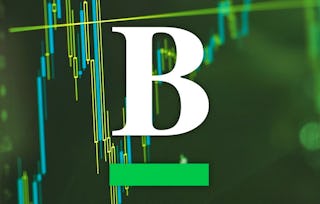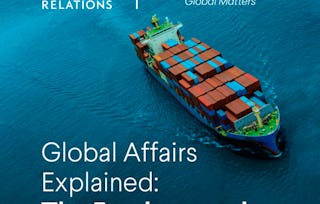What is globalization and how does it work? How can we understand the process as a whole? How are the parts of the world linked? What are the risks of living in a world where “no one is in charge”? This course introduces students to systems thinking, network theory, and risk analysis and uses these tools to better understand the process of globalization. Focusing on trade, finance, and epidemiology, it analyzes potential challenges to the current global order.

Global Systemic Risk

437 reviews
What you'll learn
We introduce several new analytical concepts and tools including globalization, complexity, networks, and risk analysis.
We use these to explore the contemporary world and the dynamics behind our modern life.
Skills you'll gain
- Supply Chain
- Governance
- Analysis
- World History
- Social Network Analysis
- Financial Systems
- Complex Problem Solving
- Economics
- Risk Analysis
- Epidemiology
- International Relations
- Public Health
- Systems Thinking
- Skills section collapsed. Showing 12 of 13 skills.
Details to know
6 assignments
See how employees at top companies are mastering in-demand skills

There are 6 modules in this course
Welcome to Week 1 in which we define and analyze what we mean by globalization. In these lectures, you will be introduced to the origins, benefits, and costs of globalization.
What's included
14 videos2 readings1 assignment2 discussion prompts
In Week 2, we learn about the concept of systems analysis and the insights it provides into a complex world.
What's included
10 videos1 reading1 assignment1 discussion prompt
Welcome to Week 3! At the end of this week, you will be better able to identify the sources of risk in our contemporary world and to integrate the concepts of globalization, systems, networks, and risk.
What's included
10 videos1 reading1 assignment1 discussion prompt
Money and trade make the world go round, but the system is fragile.
What's included
8 videos1 reading1 assignment1 discussion prompt
In Week 5, we analyze COVID-19 through a GSR lens and discuss the challenge of governing a global system.
What's included
5 videos1 reading1 assignment1 discussion prompt
In this last unit, we finish with a discussion of what the worst that could happen is.
What's included
7 videos1 reading1 assignment1 discussion prompt
Instructor

Offered by
Explore more from Governance and Society
 Status: Free Trial
Status: Free TrialIE Business School
 Status: Free Trial
Status: Free TrialCouncil on Foreign Relations
 Status: Preview
Status: Preview Status: Preview
Status: PreviewUniversità di Napoli Federico II
Why people choose Coursera for their career

Felipe M.

Jennifer J.

Larry W.

Chaitanya A.
Learner reviews
- 5 stars
80.32%
- 4 stars
16.47%
- 3 stars
1.60%
- 2 stars
0.45%
- 1 star
1.14%
Showing 3 of 437
Reviewed on Feb 13, 2022
Our tutor made a complex field accessible, interesting and pleasant to engage with. I particulalry enjoyed the wealth of visuals, simplification of language and the interviews with specialists.
Reviewed on Nov 12, 2023
For those who want to deepen their knowledge of systems thinking, network theories, and risk analysis in the context of globalization, this is a valuable resource with a wide range of readings.
Reviewed on Aug 10, 2023
One of the best courses I've ever taken online! Thank you for a very thorough and engaging course!

Open new doors with Coursera Plus
Unlimited access to 10,000+ world-class courses, hands-on projects, and job-ready certificate programs - all included in your subscription
Advance your career with an online degree
Earn a degree from world-class universities - 100% online
Join over 3,400 global companies that choose Coursera for Business
Upskill your employees to excel in the digital economy
Frequently asked questions
No. All features of this course are available for free.
No. As per Princeton University policy, no certificates, credentials, or reports are awarded in connection with this course.
To access the course materials, assignments and to earn a Certificate, you will need to purchase the Certificate experience when you enroll in a course. You can try a Free Trial instead, or apply for Financial Aid. The course may offer 'Full Course, No Certificate' instead. This option lets you see all course materials, submit required assessments, and get a final grade. This also means that you will not be able to purchase a Certificate experience.
More questions
Financial aid available,

